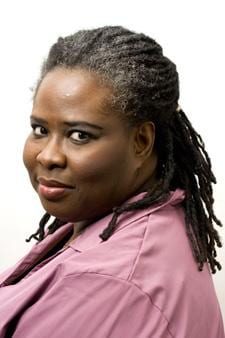If you’re a drag queen planning a trip to Trinidad, Rhoma Spencer wants you to know there’s no need to feel unsafe. The lethal reputation your sisters in heels hold in the island nation will likely be enough to protect you.
“Straight people were often afraid of drag queens because they were known to be very violent,” says the Trinidad native. “I grew up knowing queens walking the streets without fear. Those ladies would not think twice to stab you with an ice pick if you looked at them the wrong way.”
The lesbian theatre director has called Toronto home since 1999, when she came here to study directing at York University. Her latest production, New York writer Edgar Nkosi White’s I Marcus Garvey, chronicles the life and times of the Jamaican activist and agitator. Spanning 22 years of Garvey’s life, the piece uses a combination of performance and multimedia, including a live band that plays both traditional Caribbean music and jazz standards from the Harlem Renaissance.
Seen by some as the godfather of modern black activists Malcolm X and Martin Luther King, Garvey was ahead of his time.
“Here is a Jamaican man with the audacity to travel throughout the US in the early 1900s, risking his life in Jim Crow southern states to observe the plight of black people in different communities,” says Spencer. “He was also concerned about future effects of European colonial powers carving up Africa. You need look no further than the civil wars in Rwanda, Sierra Leone and The Congo to see what he was talking about. More recently, Egypt and Libya come to mind.”
Spencer’s own journey as a queer artist has been no less complex. Though more open-minded than its island neighbour Jamaica, Trinidad is not known for being particularly gay-positive.
“As a lesbian I had it easier because I wasn’t considered a threat,” she says. “But the guys have it much harder. I had friends who were harassed on the job or verbally abused. They use lots of subtle ways to make you feel ashamed of who you choose to love.”
Even prior to her studies, Toronto was a sort of gay mecca for Spencer. She was able to access the works of local lesbian writers Dionne Brand and Shani Mootoo back home in Trinidad, which served as her gay coming-of-age material.
“I was aware of the black lesbian movement taking place in the city, and I felt like I wanted to be a part of it,” she says. “When you come from a space where you have to hide who you are, coming to Toronto is an awakening. You have no idea how good it feels to be able to have this conversation with a publication, without any fear of backlash.”
But leaving Trinidad behind did not mean an end to discrimination. Spencer has felt the sting of homophobia from the Caribbean-Canadian community, too. Though she was a chart-topping singer back in Trinidad, she laments that she is never asked to share her talents here.
“Maybe if I would keep my sexuality a secret I would be more highly favoured,” she says. “There are some in the community who have not learned the ways of the new country and still walk with their old island habits. People of the African diaspora have embraced the church because when people are oppressed, they often turn to religion to ease the sting of injustice. The Afro-Canadian community can be homophobic because people have been formed by the church and its doctrines, which has preached Sodom and Gomorrah from time immemorial.”


 Why you can trust Xtra
Why you can trust Xtra


